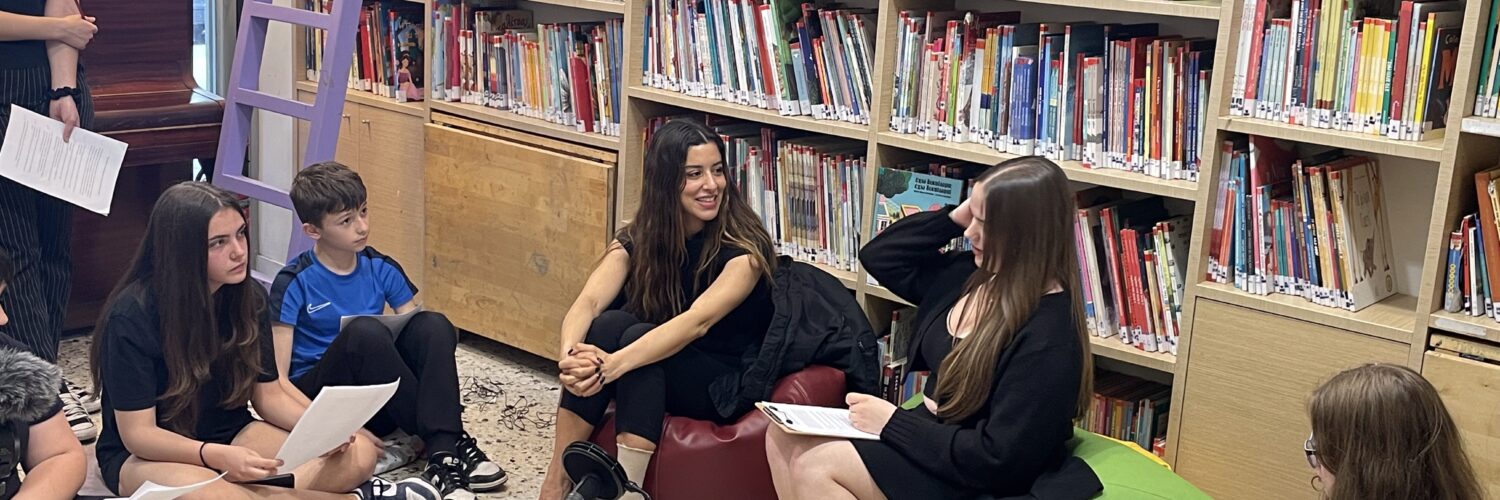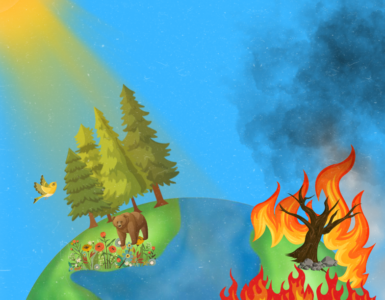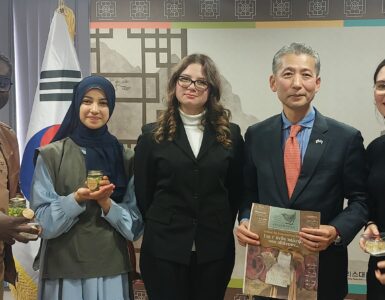A sunny day filled with laughter, excitement, a bit of anxiety (yes, we were nervous!) and a lot of enthusiasm: the Young Journalists – Migratory Birds team welcomed Marina Satti for an interview full of authenticity, kindness and energy! She spoke with us about her first steps in music, the importance of cultural identity, and the power of diversity.
Marina grew up between two cultures – Greek and Sudanese. She grew up with images and experiences that inevitably blend together and are reflected in her sound. As she confessed to us, it is not only the Arabic or Greek musical elements that inspire her, but the very concept of acceptance and the courage to experiment without limits.
“All experiences shape the way you express yourself,” she told us.
And that is why her music is so unique: a mixture of traditional influences, pop rhythms, improvisations, and her own personal color. She is not afraid to experiment – and it shows!
She also spoke to us about her early steps, back when she was studying classical piano and was not allowed to sing during school performances.
“Why shouldn’t I sing too?” she wondered.
If she had listened to those voices, she might not have gotten here.
“If you believe in it, you should try!”, she said, offering a powerful dose of inspiration to the young people listening.
When we asked how she felt when she was invited to go to Eurovision with “Zari”, she admitted:
“I was nervous! I didn’t know what to expect, but I’m glad I did it.”
For her, it was a challenge that involved many people, dedication, and… a lot of rehearsals.
Some songs are born in hours, others in months. “Ah Thalassa” was magical from the beginning. As she revealed, the final melody came from a single recording, while she was playing piano and improvising in the studio. The lyrics by Lena Kitsopoulou matched perfectly with the sea-inspired feeling, even before she told her about it.
“I had this idea to make a music video in the sea and show the other side of the stereotype of the Greek islands, the ‘Greek summer’ as most people know it: colorful holidays on the beach…”
She wanted the song and the video to show another Greece. We all have the familiar image of Greek summer – bright, carefree, festive. But there is also the other side:
A sea with depth.
Marina does not remain only on the stage. She collaborates with the UNHCR (United Nations High Commissioner for Refugees) as an official Supporter. Everything started unexpectedly; within one week, the collaboration was formed for the music video of “Ah Thalassa,” thanks to a suggestion from her brother.
“I wanted to combine it with a call for people to support an organization.”
And so it happened.
She later visited refugee accommodation centers in Lesvos, singing with children and bringing music and joy into difficult circumstances.
“These small activities gave us more ideas to work together again in the future and to present much more in collaboration with UNHCR. Yes, we are planning many things — and you will see them too,” she told us.
When asked whether her music reflects the contemporary youth of Greece, she replied without hesitation:
“I live here. I’m influenced by here. So yes, it definitely reflects me — and maybe others — in Greece today.”
Her new album, as she told us, has everything: ballads, dance tracks, a bit of 90s nostalgia, a bit of party feeling, and a lot of smiles. Some songs make her “smile” every time she hears them. And we completely understand that! During the conversation, she also introduced us to Lola — a fantastic persona who embodies a dynamic, independent, free woman, with humor and confidence.
“Lola is a goddess,” she said, laughing.
Simple, strong, and real.
Finally, when we asked what advice she would give to a young person today, she was clear:
“Listen to yourself. Trust your instinct.”
Because the ones who ultimately succeed are those who dared and didn’t stop.
And somewhere here… our conversation ended with gifts, smiles, photos, autographs, and… phones on fire! Marina left behind inspiration; the feeling that you can be authentic, creative, and… become your own Lola.
Interview
Marina Satti: Hello!
Journalist: We are very happy that you accepted our invitation and that you are here today, at the Network for Children’s Rights.
Marina Satti: Thank you very much for the invitation.
Journalist: We are the journalists of the Migratory Birds newspaper, created by teenagers and young people from different nationalities, and published once a year. We would be very happy to ask you some questions.
Journalist: First question: How has your cultural background influenced and inspired your music?
Marina Satti: It definitely plays a role — the fact that my father is from Sudan and my mother is from Greece. But I think all images and experiences shape the vocabulary you develop and inspire you somehow: the trips I’ve taken, the people I’ve met…
Studying music — classical, jazz — and then watching pop performances, hip-hop songs… all of that has shaped me.
But, to return to the main question: it’s not so much about using Arabic or Greek elements, as much as being familiar with difference, blends, mixtures. I think I have a tendency to experiment, to dare, and not to be limited by boundaries.
Journalist: Is there someone who encouraged you to follow singing?
Marina Satti: Actually, let me tell you a story from when I was in school — in junior high, I think. I had been playing classical piano since elementary school, and I took part in a school music competition where I decided to play piano and sing — to accompany myself. There was a teacher there from the Conservatory who had known me for years — I was generally quite good at piano.
After the competition, she told me:
“You should have played only piano, not sung and played at the same time.”
And I don’t know — that stuck with me and made me think a lot, maybe even upset me. Because many girls sang, but very few played piano, so the teacher preferred that I accompany others on stage rather than sing myself. And I thought:
“Why? Why won’t they let me sing and be a singer? Am I only supposed to play piano?”
Conclusion:
You may hear many opinions growing up — everyone will have something to say. If I had listened to that teacher back then, what has happened now would not have happened. So if someone wants to do something and it comes from inside them, they will go through different stages — they will hear many different voices around them. But if you believe it, then try it!
I hadn’t decided I would become a singer; I just liked singing.
Over the years, it unfolded little by little, here and there. And eventually I said:
“Alright, I like this. I’ll do it. I’ll try.”
Journalist: Can you tell us the story behind “Ah Thalassa” and how it was composed?
Marina Satti: I remember one afternoon at my friend Nikos Kodonas’ studio — we work together. I was at the piano, just playing and singing melodies. Usually, I do many improvisations, lots of recordings, then I listen back and choose the parts I like to make a kind of “collage” that becomes the final composition.
But with this song, for some reason, the entire melody was formed in one take. The way it was recorded — while I was improvising — that became the final melody. I liked it, and I gave it to Lena Kitsopoulou, who wrote the lyrics.
The whole project revolved around stereotypes of Greece — the tourist image, what foreigners think of us: festival music, celebrations, sirtaki… I had used these elements humorously — feta, the Acropolis, souvlaki — you know…
But I wanted the album to end with a reversal, with “Ah Thalassa.” I wanted to make that music video in the sea and show the other side of the stereotype of Greek islands and beaches — the Greek summer everyone knows — but also the side of the sea as the route for thousands of people who leave their homes and follow their dreams for a better life.
The other side of the coin.
And believe it or not, when Lena sent me the lyrics in a photo, the title said “Ah Thalassa”!!
And I said:
“You’re kidding! I can’t believe this!”
I hadn’t told her anything.
So I thought — OK — there is some kind of alignment here.
Journalist: How did you feel when you were asked to represent Greece at Eurovision with “Zari”? Did you have doubts?
Marina Satti: When you take on such a big project, you feel nervous and you try to do your best. It was something new, different from anything I had done before. This year, they invited me again to go as a guest and sing a short piece, and when I stepped on the stage, everything felt more familiar. And I thought:
“If I had known last year what I know now, things would have been different!”
Whenever you do something new, you don’t know what to expect.
When you roll the dice — you don’t know what number you’ll get! (laughs)
But we tried. We all did our best together. It was a months-long effort with many people. And I am happy I did it — I learned many new things and I’d like to believe that people also enjoyed the journey.
Journalist: Is there a song in your new album that feels most personal to you?
Marina Satti: Most personal… honestly, they all feel personal, because I have written them, shaped them, worked on them at every stage with my friends-collaborators. We made changes, corrections, left them aside and came back to them. Often in the process you say:
“No, I don’t want it.”
Then:
“Yes, I want it.”
But every song is different. There are ballads, dance tracks. It depends on the moment — what you’re doing, what you want to listen to.
For example, you probably won’t listen to Mixtape before sleeping — you probably won’t fall asleep! (laughs)
Some songs are happier — like “Blouzaki” — I can’t listen to it without smiling. It lifts my mood. And it reminds me of some pop songs from the 2000s when I was younger — you probably don’t know those! There is a bit of 90s/2000s nostalgia in there.
Journalist: If Lola were a real person, how would you describe her? What does she embody?
Marina Satti: Lola is a persona, a character we created. She is a dynamic and independent woman who doesn’t care what others say, who doesn’t care about stereotypes. She is free, independent, strong, she works, she wants to look good, take care of herself, go out with her friends and be herself without guilt, without fear. That’s how we imagined her.
Some parts of Lola I definitely have — and some parts I would like to have.
Lola is a goddess! (laughs)
Journalist: How did you combine your work in music with your activism with UNHCR?
Marina Satti: I was lucky, because everything happened very quickly. I had already filmed the music video, and the song had already been released, and about a week before we published it (in July 2023), my brother — who has a friend working at UNHCR — told me:
“Should we reach out to them? Maybe we can connect this with their work?”
I already had the idea that I wanted to combine it with a call for people to support an organization.
And it all came together in one week!
This is rare, because these things usually take months and require many approvals. But UNHCR said “yes” and we did it so fast I couldn’t believe it.
Then in December I visited a refugee reception center in Lesvos with two friends I sing with — Erasmia and Elena — and we did musical activities with the children, we sang in Arabic as well.
These small actions gave us more ideas. Yes — we are planning many things. And you will see them.
Journalist: Do you think your music reflects today’s Greek youth?
Marina Satti: Does it reflect Greece today? Definitely part of it. I live here, my collaborators live here, so of course we are influenced by our environment and by current music trends. I am personally interested in discovering new things and riding the wave of what is happening now — because it changes constantly — like language — and that is very interesting.
The music scene today is shaped by the people who make it.
Journalist: What advice would you give to a young person today?
Marina Satti: External information is important — but even more important is that each person listens to themselves and trusts their instinct — what they like, what suits them. Not to want something just because someone else does it — maybe it does not fit you.
So: Trust your judgment and your instinct.
You will hear many things in life — listen to everything, but you decide whether that information helps you grow.
Follow what inspires you to move forward, not what discourages you — because discouragement is always easier.
Those who achieve things are the ones who dared and didn’t stop.
Journalist: Thank you so much for being with us.
Marina Satti: Thank you too!
Journalist: And for answering our questions. We wish you success in everything you do. But…
Journalist: We also want to give you a gift, so you can remember us!
Marina Satti: Ahhh! Thank you very, very much!









Add comment